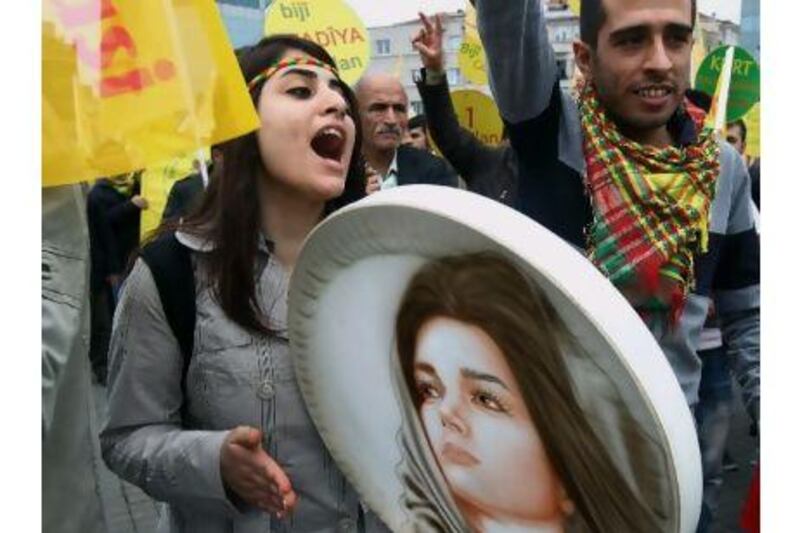ISTANBUL // When Turkey's opposition leader attended the first rock concert of his life the other week, it was more than just a fun night out. It was a political message. In a country where half of the population is younger than 29, younger and first-time voters are enjoying special attention from political parties before parliamentary elections June 12.
Kemal Kilicdaroglu, the main challenger to Recep Tayyip Erdogan, Turkey's prime minister, went to a concert of Turkish musicians playing rock classics that included songs by Jimi Hendrix and Led Zeppelin in Ankara last month. "Tonight we have found a common denominator with the youngsters," Mr Kilicdaroglu said afterwards.
Mr Kilicdaroglu's party, the secularist Republican People's Party, or CHP, is fighting a reputation of being a club of old men in grey suits. Before a recent shake-up by Mr Kilicdaroglu, who became party leader last year, the CHP leadership was sometimes referred to as the "Politburo" in the press. According to a poll published earlier this year, the bulk of CHP voters are older than 45 years, in a country where people from the age of 18 have the right to vote.
As almost half of Turkey's 52.7 million voters are younger than 34, all parties are wooing young people with plans for reforms in the education system and other projects that are likely to appeal to them.
Mr Kilicdaroglu's party promises to cut the mandatory military service for every Turk male from 15 to 6 months. Devlet Bahceli's right-wing Nationalist Movement Party, or MHP, says it will abolish university entrance exams. The government says it will make sure more people can get a university degree and will put a focus on better foreign-language skills. In their effort to go with the times, leading Turkish politicians, Mr Erdogan, Mr Kilicdaroglu and Mr Bahceli, have launched Twitter accounts.
Bekir Agirdir, a pollster, told yesterday's Taraf newspaper that Mr Erdogan's ruling Justice and Development Party, or AKP, which is seeking a third term in government, can expect another big win with 46 to 50 per cent of the vote, with the CHP trailing at between 25 and 27 per cent and the MHP following at 9.5 to 10.5 per cent. In the last elections in 2007, the AKP won 47 per cent, the CHP 21 per cent and the MHP 14 per cent.
No other party is expected to cross the threshold of 10 per cent of the nationwide vote needed to win seats in parliament. Turkey's main Kurdish party, the Party for Peace and Democracy, or BDP, is fielding nominally independent candidates, who are exempt from the 10 per cent rule, to get around the barrier and can hope to get around 25 to 28 deputies into the chamber of 550 deputies, according to Mr Agirdir, the pollster.
Even though no one expects the AKP to lose the elections, some experts say that the opposition has a good chance of eating into Mr Erdogan's share of voters by concentrating on the young. A youth unemployment rate of around 22 per cent among Turks aged between 15 and 24 was one of the factors that could benefit CHP and MHP, pollster Adil Gur, the head of the polling firm A&G, told the daily newspaper Sabah last month. A series of alleged cases of corruption involving university entrance exams could also hurt the ruling party, Mr Gur said.
Other observers point to a more general dissatisfaction with a government that has been in power since November 2002. Tens of thousands of people gathered on Taksim Square in central Istanbul on May Day, many shouting protest slogans against the Erdogan government. "The first thing I noticed on Taksim Square was how young everybody was," Asli Aydintasbas, a columnist, wrote in the Milliyet newspaper.
But observers are divided on how the youth factor will play on election day. Even if some young voters do turn away from the AKP, the shift would not amount to more than two or three percentage points, Tarhan Erdem, Turkey's most respected pollster since he predicted the scale of the AKP's last election win in 2007, said earlier this month. Even reports of alleged foul play during university exams were unlikely to concern Mr Erdogan deeply, because most AKP voters had not attended university, Mr Erdem said.
"The biggest trump card for the AKP is the economy," Mr Erdem said. Turkey's GDP grew just under nine per cent last year alone and has doubled since the AKP came to power in 2002.
Not surprisingly, Mr Erdogan has been using the country's economic boom, increased consumer spending and a rising living standard for many people as arguments to convince voters to give the AKP another term in government. At a recent campaign event, the prime minister said Turks would buy up to one million cars this year and had bought 436,000 refrigerators in the first three months of this year, almost 100,000 more than in the same period in 2010.
Mr Erdem said economic factors such as these were likely to be dominant on June 12. "If the economy was not such a success, other factors would matter more," he said.
He declined to give his own estimate of a possible election outcome, citing confidentiality agreements with clients of his Konda polling company.






